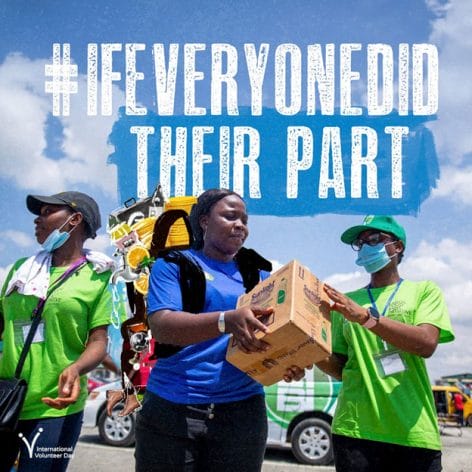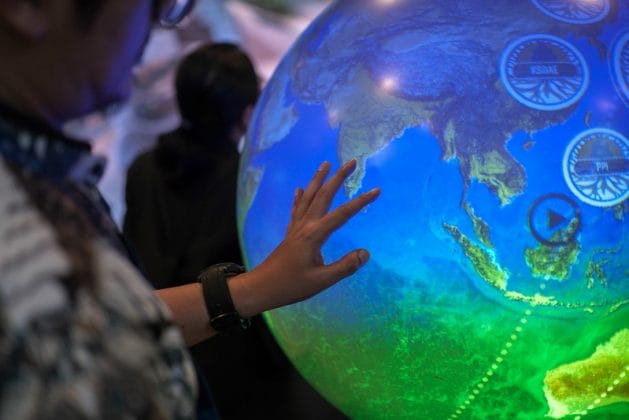
Civil Society, Democracy, Featured, Global, Headlines, Human Rights, IPS UN: Inside the Glasshouse, TerraViva United Nations

UN Volunteers Day is commemorated annually on December 5.
– If there is an agency or program within the UN that I really admire and wish the best for, this is the United Nation Volunteers or UNV. Its overarching mission, mandate and key objectives are paramount for humanity.
Unfortunately, volunteerism is neglected worldwide and its transformative importance never fully understood. There are no single issues affecting our planet and the whole humanity that does not require volunteerism.
That’s why UNV that is technically part of UNDP, has a big role to play. Yet, to some extents, UNV is missing into action as it has been unable to raise to the challenges. It can be an issue of lack of availability of resources or it could be the complex red tape system bogging down the whole UN System.
It can be simply the fact that each agency and program within this galaxy of UN entities is simply not too adept at mainstreaming and embed volunteerism in their operations. For sure, UNV does not lack expertise nor very passionate and capable persons, some of whom I have been able to collaborate with in the past.
They really believe in the cause, in the promotion of volunteerism and they really want to push hard so that development can fully leverage its power. But somehow, considering its expertise, UNV is underperforming.
Probably one of the biggest challenges for an organization like UNV is the difficulty in engaging and involving stakeholders on continuous basis. There are actually some big success stories for UNV on this regard.
For example, the Global Technical Meeting held in July 2020 after months of preparations was a truly, groundbreaking initiative.
The end result was an important blueprint to embed volunteerism in the global development agenda, ensuring that volunteerism could really placed at the center of the pursuing the Agenda 2030 and the Sustainable Development Goals.
Getting the Global Technical Meeting in place took months of preparation and several online discussion groups were created where stakeholders, practitioners and citizens passionate about volunteerism, could contribute. Enabling such forums was remarkable and a true achievement for UNV.
Yet after more than three years since then, no real follow up mechanism has been established. The initial excitement that a new level of global discussion on volunteerism had been achieved, then rapidly declined.
Now I am wondering why in the recently held SDG Summit, to my best knowledge, there was no serious debate on what volunteerism can do to support the implementation of the Agenda 2030.
It is not surprising, therefore, that there has not any apparent and inclusive exercise to revise the implementation of The Plan of Action to Integrate Volunteering into the 2030 Agenda.
Another example is the organization of the International Volunteer Day (IVD) that is celebrated December 5. This can be a great opportunity not only to raise awareness but should also be seen as a key platform to engage and mobilize people throughout the year.
So far, the practice, at countries level, has been to have a sort of coordination mechanism one or at the most two months before the celebrations. While it is important to bring practitioners and stakeholders together for IVD and while I always considered these engagements meaningful, I always felt that we were missing an opportunity.
I always believed that IVD should be not only a big carnival, a moment of joys where local volunteering champions are recognized and duly acknowledged. This component is essential and always needs to be on the front.
At the same time, the day should be used to talk about the less glorious and yet important nitty gritty of policy making. Many might not think of this aspect as strategic.
Yet, if we really want to elevate volunteerism at the center of the Agenda 2030, it is essential to discuss about policies and legislations that can truly empower volunteering efforts for social change.
Think for example about the process of localizing the SDGs? Can’t it be a phenomenal way of engaging and involving citizens? Participation is also a key aspect of volunteerism and a key tenant of the broader concept of civic engagement.
Yet the most important function for IVD is to rally together the whole “movement”, all those love volunteerism: academicians, practitioners, experts, representative of national and international NGOs, donors but also students and any citizens passionate about it.
This means coming forward with extensive planning and collective capacity to execute them, a process that requires months and months of preparation. By my own observation, it was way too late, towards the end of November, when UNV started sharing information about today’s main message.
Even deciding on the theme of IVD could become an exercise of participation with rounds of consultations, ideas contests to provide the best and more meaningful ideas for it. In a way, IVD, in the way I see it, should be seen as the pinnacle of a whole year coordination exercise, not only an end into itself but a catalytic event that stirs the movement to action throughout the year.
UNV has a unique role to help shape this whole dynamic. Conducive to it would be the creation of coordination mechanisms that bring together all the stakeholders. These could take different shapes and forms, from informal working groups to more formal networks and forums.
Based on my own experience, it is wise to start small and then build momentum gradually, step by step. These mechanisms would not only work as info sharing and coordinating platforms but also as groups that plan and execute joint events and activities all year long.
For example, running two or three of such activities, like discussion forums, or awareness trainings at school levels could precede and build excitement around the final big event, IVD. There is no other player that has the mandate and convening power like UNV to bring together such collaborations.
At the same time, I am fully aware that resources at disposal for UNV are not endless especially in times of crises and UNV local country offices have to balance many competing priorities.
That’s why better and more strategic coordination at local level could tremendously help UNV pursue its mission. Another one that deserves attention is the mobilization of UNV Volunteers.
I always felt something odd about such programs. In reality, the program, even if admirable, is basically a full-time paid job. If you compare its stipends or allowances with formal UN jobs, it is clear that a member of UNV just receives a decent remuneration.
Yet the reality is different and more complex. Compared with many local jobs offered by local NGOs, that same package disbursed to an UNV volunteer looks like an awesome salary.
But the compensation aspect is only one problematic side of the equation. The other is the fact that this form of full-time volunteerism promoted by UNV risks to create further confusion about some of the key tenants that are enshrined into it.
I am referring to the cooperative, solidarity driven and generosity filled self-conscious decision of helping, even in very organized forms, others. By no means, I am implying that full time volunteering is intrinsically and necessarily wrong.
It is one of the many ways to support a cause and act selflessly. Yet there are several other experiences of it that are better enabling positive change at grassroots levels, closer to the beneficiaries that can, more easily, become true partners in advancing social justice.
In these examples, international full-time volunteers do get some allowances that provide for their basic expenses and live safely and with dignity. Yet these “privileges” are not too detached from the reality of the hosting countries.
National and International UNV Volunteers are on many ways promoters of positive development outcomes and should be praised for their commitment. Yet there is something wrong when many join the UNV volunteer program, either nationally and internationally, because they know that this is a great launchpad to full fledged careers with the UN.
I have no doubt that UNV is uniquely positioned to enable systemic social and economic progress.Its mandate and mission are more important than ever. Yet from engaging in the global discussions to achieve the Agenda 2030 to rethinking the role of citizens in the delivery of essential services, including ways people can participate in the decision making, volunteerism is the hidden gem of the global development agenda.
In this International Volunteer Day, let’s praise the accomplishments so far realized by UNV. At the same time, let’s work together to ensure that a more agile, proactive organization can turn itself into a much stronger hub of activism, social change and dynamic discussions.
Volunteerism is a too important aspect of our humanity.Only a revamped UNV can leverage it and help it truly become indispensable dimension of our lives, not only in the South but also the North as well.
Simone Galimberti is the Co-Founder of ENGAGE and The Good Leadership. He is based in Kathmandu, Nepal.
IPS UN Bureau



